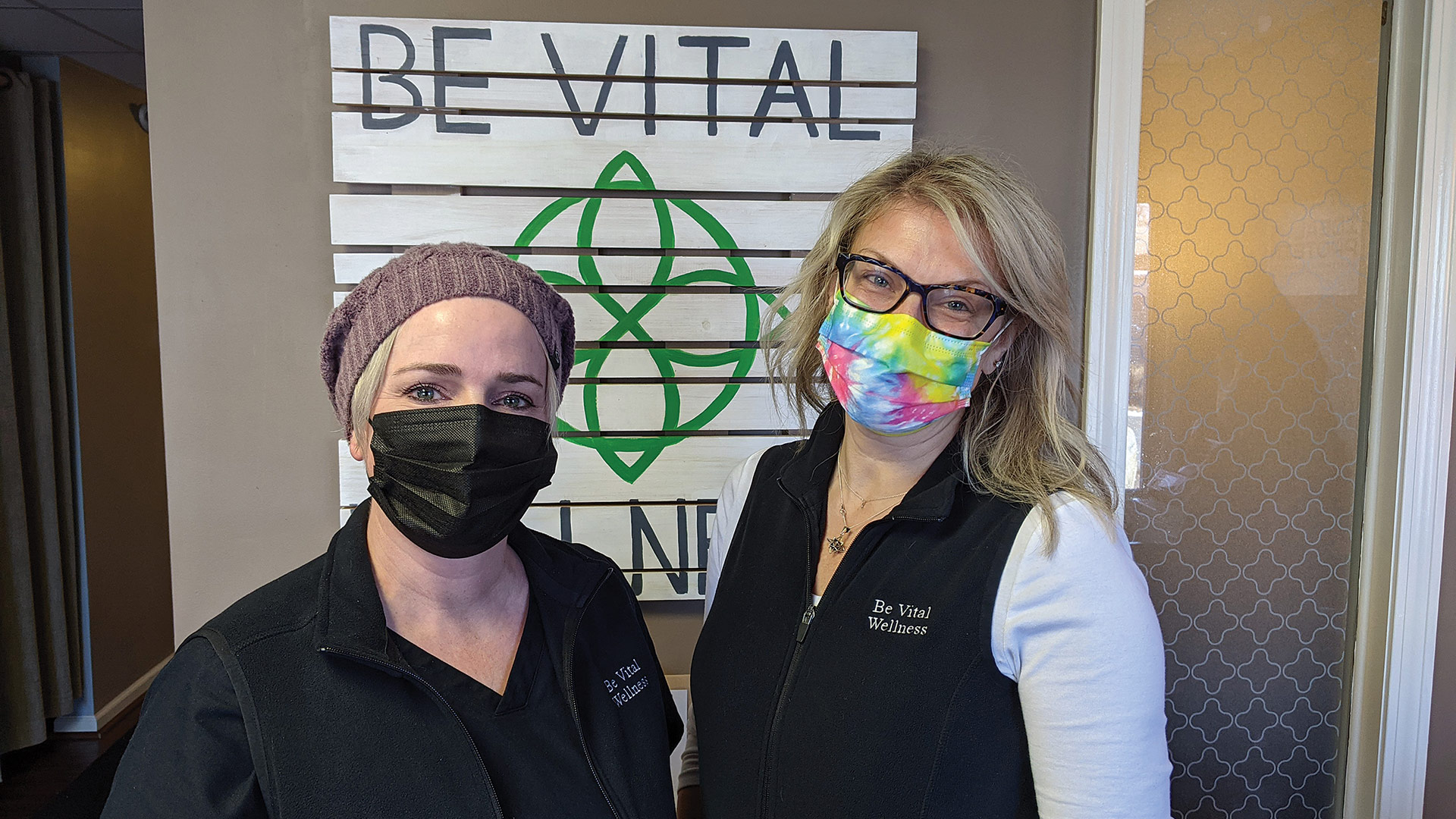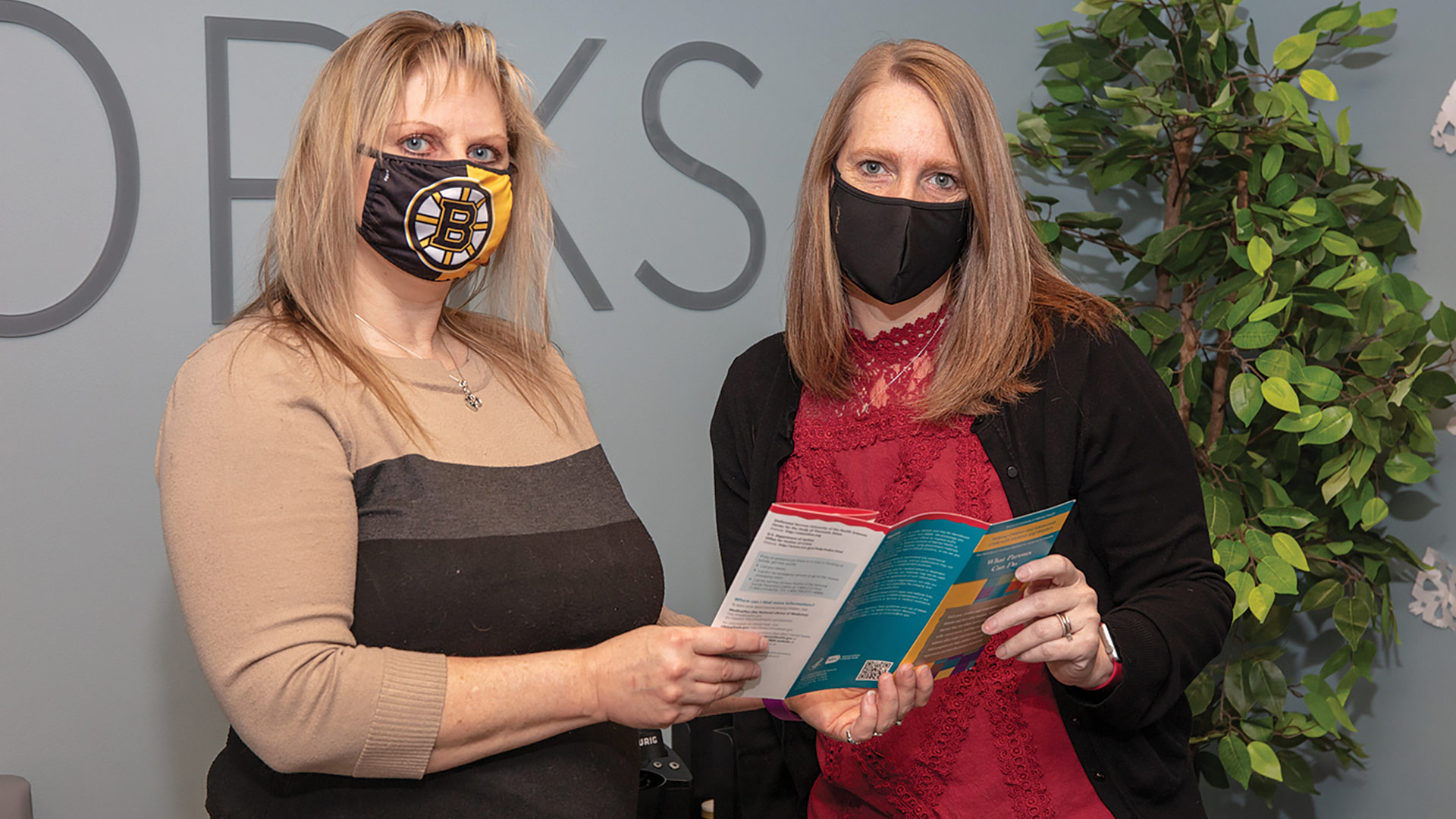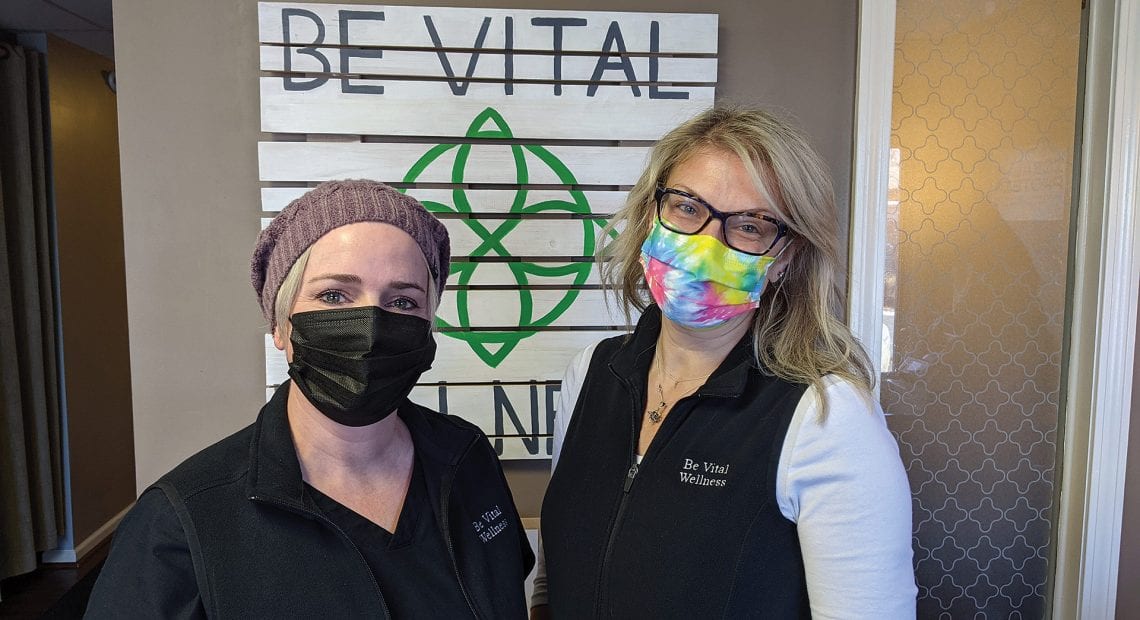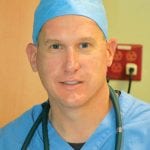Impact Statements

Jeanette Wilburn (left) and Stephanie Nascimento say the pandemic has increased people’s anxiety — and the need for self-care.
Stephanie Nascimento and Jeanette Wilburn have long explored the connections between physical and emotional health at their decade-old practice, Be Vital Wellness. These days, they say, with so much anxiety gripping Americans, it’s more critical than ever to understand those connections.
“Obviously, mental illness has always been a crisis, but it’s at an all-time high now,” Nascimento said. “We spend a lot of time digging with our clients. They don’t always walk in the door and say, ‘I’m depressed.’”
In fact, the Hadley-based business began as a weight-loss and nutrition enterprise, and that’s still a major part of it. But Wilburn said it’s gratifying when clients begin to understand how their choices and circumstances affect them in ways they’ve never considered.
“Sometimes people don’t even know they’re depressed; they don’t know they’re anxious,” she explained. “They just know that they can’t fall asleep, or they can’t stay asleep, or they wake up at 3 o’clock in the morning. A lot of people call it ‘busy brain,’ but they don’t realize that’s actually anxiety. I liken it to a hamster on a wheel, and the hamster is going way too fast. You need to either slow down the wheel or get the hamster off the wheel altogether.”
The problem is, almost a year of living with the COVID-19 pandemic, and its impacts on physical and mental health, relationships, and finances, has only cranked the wheel faster, and too many people are coping with unhealthy habits like overeating and alcohol abuse.
“ I liken it to a hamster on a wheel, and the hamster is going way too fast. You need to either slow down the wheel or get the hamster off the wheel altogether.”
“Those bad habits were there before COVID — then the pandemic arrived,” Nascimento said. “There’s so much fear, not to mention people’s whole lives are changing. Kids are home from school, parents are trying to be teachers while also working and managing Zoom calls … there’s been a lot of stress on families. We’ve had clients who were managing well, but are now struggling to maintain good habits.”
Kristy Navarro, clinical supervisor for BestLife Emotional Health & Wellness Center, a program of MHA, said the causes of increased anxiety are easy to understand.
“A lot of it is the stress people are going through financially. People have had to close down businesses they owned and lost all their income. So that produces this feeling of anxiety — ‘where am I going to get the money to pay my bills? How am I going to stay in my house? I wasn’t in debt, and now I am, so how am I going to do this?’”
That anxiety can manifest in different ways, she added.

Alane Burgess (left) and Kristy Navarro say the first step to dealing with anxiety and mental-health stresses is talking about them.
“It can be physical — the shaking, the heart pounding, sweating. It can look like avoidance — maybe not checking your mail or not going outside. It’s not just being worried, but genuine fear. Fear and feeling worried are two different things.”
Dr. Mark Kenton says healthcare workers have been feeling anxious, to varying degrees, since the start of the pandemic.
“The anxiety, depression, and worry all got heightened,” he said, especially in the early days last winter, when so little was known about coronavirus, and news media reported on soaring death counts in places like New York City. “It made you think, ‘if I get this, am I going to die?’ You think of the worst-case scenario. Healthcare providers had that anxiety, and a lot of us had to find ways to get through.”
These days, as the pandemic wears on, Kenton, an emergency medicine physician at Mercy Medical Center, still worries about such issues — and not just for providers.
“I’m definitely worried about healthcare providers getting exhausted or getting sick, but also the mental health of patients, and especially the mental health of children who have to do this remote schooling for a year and a half. What is the actual impact on children going forward?”
It’s a question being asked across the U.S., and it has no one-size-fits-all answer. But the overwhelming sentiment BusinessWest heard from health and wellness experts in the region is this: help is available. Don’t be afraid to ask for it.
Take Control — but Know When to Let Go
Navarro said much of the anxiety and depression related to the pandemic has to do with isolation — and not just physical isolation.
“We’re asking people to physically isolate,” Navarro said. “What’s more concerning is when we emotionally disconnect from people — the inability to reach out, or to get the support we need when we feel we need it.”
Kenton agreed. “Our lives have been completely turned upside-down. We’re supposed to be social beings; that’s part of our underlying nature. Now everyone has lost that element. We have elderly people who have been completely isolated and haven’t seen loved ones since March.”
It doesn’t help that many things people like to do to escape from their troubles — and get some exercise — have been eliminated or limited.
Dr. Mark Kenton
“Our lives have been completely turned upside-down. We’re supposed to be social beings; that’s part of our underlying nature. Now everyone has lost that element.”
“They gain weight, they don’t eat well, they get depressed or drink more alcohol. It’s a vicious cycle,” he said. “We already have difficult winters in the Northeast, between the snow and the cold; we can’t do much of anything, and now we’re completely isolated at home. We can’t even take a trip to Florida with the family for a week to get away from the cold weather.”
That said, many activities are still possible, Navarro said.
“What is it you like to do? If we’re able to continue to do those things that we enjoy doing, we can feel better,” she explained. “And also, what in this situation can you control? We know that COVID is out of our control. So, what is it that you can control in that context? Maybe the only thing you can control is wearing your mask outside and not being around other people. So control that piece, and have ownership over what you are able to do.”
Alane Burgess, clinic director at BestLife, tells clients to take some time every single day — even if it’s just 10 minutes, although 30 minutes would be better — to “relax and rejuvenate.”
“That means, allow yourself to take that step back from everything that’s going on — all the fears, the worries, and the anxieties — and do something that makes you feel really good about yourself. Maybe it’s a hobby or activity, or doing a teleconference with a family member or a loved one or somebody who is really going to make you feel good about yourself. That way, you can focus on the good feelings that some people are losing in the midst of the isolation and all the things in our lives that we can’t control.”
Wilburn promotes mindfulness, meditation, healthy eating, and a host of other ways in which people have the power to change their health and mindset — and, again, she’s a believer in the two being intertwined holistically. At a time when the world presents so many reasons to be anxious — and, if you read the news these days, it’s not just COVID-19 — she wants to teach people self-care.
“We don’t know about that as Americans,” Nascimento added. “Or we think it’s selfish. ‘Push harder, push harder, don’t take vacations.’ We’re teaching people you can work hard, but your play should be self-care — taking a long walk, getting body work done, taking five minutes to meditate.”
It’s important, Wilburn noted, because, even in better times, Americans too often live in fight-or-flight mode.
“Our nervous systems think we’re running away from a tiger, which means we’re not properly digesting our food, our heart rate doesn’t come down, and we’re not sleeping as well, because if you’re running away from a tiger, why would you be sleeping?”
She and Nascimento say people need to be educated on why it’s important to step back and take time for their own needs — but they also often need permission, especially men, who are quicker than women to dismiss the need for self-care. They’ll find that encouragement at Be Vital Wellness.
“They think, ‘I’m tough; I just need to tough this out,’” Wilburn said. “Women are better at it, but everyone needs permission.”
Don’t Ignore the Signs
While mental-health concerns have certainly been at the forefront lately, Kenton said it’s also important not to neglect physical health, especially when symptoms of serious problems arise.
“Looking back to March and April, we shut everything down and told patients that, unless they absolutely need to be in the Emergency Department, do not come,” he explained, noting that many patients use the ER as primary care because they lack a primary-care provider or health insurance. “We saw the wave in New York, then Boston, and we didn’t know what we were in for, so the message was, don’t come to the ER unless you’re sick.”
It worked — Mercy’s ER traffic fell from a daily average of around 225 to 110, with a low point of 72. And that caused concerns of a different kind.
“Before long, we were all wondering, where did the appendicitis go? Where did the heart attacks go? We started to worry that patients with symptoms were staying home, or coming in after four days of symptoms, and by then it’s really bad.”
By summer, ER volumes gradually rose again, but many patients still feared coming to the hospital — and still do — despite the safety measures in place to separate COVID-19 patients from those who have not been exposed. With elective surgeries being curtailed again and patients having trouble seeing their primary-care doctors in person — though telehealth is better than nothing — “there are a lot of challenges for patients trying to navigate the healthcare system right now,” Kenton said.
The challenges for kids and teenagers, on the other hand, have resided almost completely in the realm of mental and emotional health.
“We’re definitely seeing the impact on children,” Navarro said. “I’ve heard a lot of parents say to me, ‘my child is failing all their classes. They can’t concentrate.’ I’ve had children I work with talk about how there’s just too much, there’s not a break, there’s not a way to leave a home that maybe is having some turmoil — not being able to get a break from all that. They’re not going to school and having any socialization with friends. Yes, they see them through Zoom, but they’re not able to have those close conversations, the play time, those moments of friendship.”
One key, she said, is to keep kids connected, somehow, to other people, even if it’s just family, and don’t let them suffer in silence.
“I tell parents all the time, ‘talk to them. Have those conversations. Talk to them about what is going on, how they can cope with their feelings in an age-appropriate way.’”
For anyone struggling in any way — adults or children — it can be helpful to seek professional help. “Even with the smallest amount of anxiety, it does not hurt to talk to someone, whether it’s a professional or a friend or family member you trust,” Navarro said. “To talk about our feelings helps us gain control over them. Just talk to someone.”
MHA launched a program a couple of years ago called “Start Talking,” which promoted the importance of starting a conversation on mental-health concerns.
“Sometimes, when we just start talking to someone we trust — or, for some people, it may be a stranger they feel most comfortable talking to — when we start having a dialogue, we see how many things start coming up,” Burgess said, adding that holding these feelings in often causes them to fester and build, compounding anxiety and depression in the long run.
“People ask every day, ‘how are you?’” Navarro noted. “But when do you actually have the opportunity to tell someone how you really are? What do we usually say? ‘I’m good. Things are fine.’ But are they really?”
Most people have no problem talking about their physical pain — an aching back, for example — but feel stigmatized when it comes to discussing their emotional wellness, Burgess added. But if there was ever a time to push past that barrier, the era of COVID-19 is it.
“Every single person in the world is being impacted by this on some level. This is something we’re all collaboratively experiencing and going through — at different degrees for different people, of course. So, how do we manage a continuation of something many of us thought would end in April?”
Talking about it, she said, is a good place to begin.
With social-distancing regulations in place, telehealth has been a tremendous help for providers and clients in her field, she added, as it has helped clients continue critical conversations. One patient even kept an appointment while on vacation in Aruba because she didn’t want to miss one.
“I’m grateful for the ability to provide services this way,” Navarro added. “If we weren’t, it would be a very difficult world.”
Journey to Wellness
Many clients at Be Vital Wellness are folks who deal with crisis every day — firefighters, police officers, doctors, nurses, EMTs — and who have grappled with their own rising anxiety and depression during an unprecedented year.
“PTSD is definitely a thing for anyone in crisis care. They often don’t realize there are other options besides pharmaceuticals, and that they can increase their quality of life, decrease their stress, and decrease their anxiety,” Wilburn said, although she and Nascimento encourage clients to see their primary-care doctors regularly too, as part of a network of treatment.
“I feel like, in America, most people have depression or anxiety or both, and COVID has only upped the ante on all those things,” Wilburn noted. “People who previously didn’t struggle with those things are struggling with those things. I just saw a woman this morning — she’s dealing with severe depression, and we’re talking about getting into therapy.
“We’re not a one-stop shop,” she added. “People come to us and say, ‘help me with my weight loss,’ but then they realize there are a lot of other things they can get support around, and it becomes truly wellness.”
In this unsettled time, that’s a goal worth striving for — and talking about.
Joseph Bednar can be reached at [email protected]






